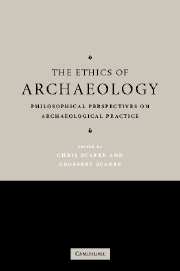1 - Introduction
Published online by Cambridge University Press: 05 June 2012
Summary
This book aims to promote dialogue between archaeologists, anthropologists and philosophers on significant ethical issues raised by the contemporary practice of archaeology. We believe that it represents the first attempt at an intellectual interchange between philosophically minded archaeologists and anthropologists, and philosophers with an interest in archaeology. But we do not think, in view of the growing sense of the importance of archaeological ethics and of the difficulty of many of the issues, that it will be the last.
The twenty-one authors of the chapters that follow comprise ten archaeologists, four anthropologists and seven philosophers. The two editors are an archaeologist and a philosopher. Since the 1980s there has been much good and innovative writing on the ethics of their discipline by archaeologists themselves and a number of substantial anthologies on the subject have appeared in print. That is just as it should be, since ethical problems in archaeology are the problems of archaeologists. It is researchers in the field who encounter the problems at first hand, and their reflections carry the authority of experience. To have to deal with a moral dilemma is a very different thing from abstractly theorising about it in one's study, and can involve a much steeper learning curve.
But whilst archaeologists may have the advantage of relevant experience, few are also trained moral philosophers, with the conceptual tools and analytical skills that have been developed within that tradition over centuries.
- Type
- Chapter
- Information
- The Ethics of ArchaeologyPhilosophical Perspectives on Archaeological Practice, pp. 1 - 12Publisher: Cambridge University PressPrint publication year: 2006
- 3
- Cited by

